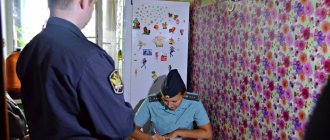New edition of Art. 91 of the Criminal Code of the Russian Federation
1. A warning consists of explaining to a minor the harm caused by his act and the consequences of repeated commission of crimes provided for by this Code.
2. Transfer to supervision consists of assigning to parents or persons replacing them, or to a specialized state body, the responsibility for educational influence on a minor and monitoring his behavior.
3. The obligation to make amends for the harm caused is imposed taking into account the property status of the minor and the availability of appropriate work skills.
4. Restrictions on leisure time and the establishment of special requirements for the behavior of a minor may include a ban on visiting certain places, using certain forms of leisure, including those related to driving a motor vehicle, limiting stay outside the home after a certain time of day, traveling to other areas without the permission of a specialized state organ. A minor may also be required to return to an educational organization or find employment with the help of a specialized government agency. This list is not exhaustive.
Commentary on Article 91 of the Criminal Code of the Russian Federation
1. A warning is a negative assessment of the behavior of the perpetrator, accompanied by a requirement to stop illegal activities and providing for the possibility of real application of a criminal law sanction if the criminal activity continues.
2. The main content of a warning as a PMV is to explain to a minor offender the legal consequences of repeated commission of an act prohibited by the Criminal Code of the Russian Federation, familiarization with the dispositions and sanctions of the relevant articles of the Criminal Code of the Russian Federation. In this case, the person is explained what the social danger of the act he has committed and its specific harmful consequences are.
3. Supervision of juvenile offenders consists of monitoring their behavior and conducting appropriate educational work with them. Minors are supervised by their parents, persons in loco parentis, or a specialized government agency. The duration of the supervision period is established by the court: from one month to two years when a teenager commits a crime of minor gravity, or from six months to three years when committing a crime of medium gravity (Part 3 of Article 90).
4. Imposing the obligation to make amends for the harm caused means compensation for the damage caused by the crime using one’s own means or one’s own labor. This measure is prescribed taking into account the property status of the minor and the availability of appropriate labor skills. A mandatory attribute of the PMV in question is the imposition on the guilty person of the obligation to apologize to the victim, in appropriate cases - publicly.
5. Restrictions on leisure time and the establishment of special requirements for the behavior of a minor are imposed, as a rule, in cases where a criminal offense was committed in leisure conditions.
5.1. Restrictions may apply to driving a car, motorcycle and other mechanical vehicles, staying away from home after a certain time of day (for example, after 20:00), and traveling to other areas. If there is an objective need to travel to another area, a minor with such a restriction must obtain permission from a specialized government agency.
5.2. Special requirements for the behavior of a minor may be expressed in the requirement to resume studies in a general education or vocational educational institution, or get a job.
5.3. The duration of the term of the mentioned measures is determined by the court: from one month to two years when a teenager commits a crime of minor gravity, or from six months to three years when committing a crime of medium gravity (Part 3 of Article 90).
6. A minor may also be subject to requirements not provided for in Part 4 of the commentary. articles with a list (for example, the requirement to behave properly in the family, not to run away from home, etc.), since the latter is not exhaustive.
Commentary to Art. 90 of the Criminal Code of the Russian Federation
Compulsory educational measures are an independent form of government response to the unlawful behavior of minors. By their legal nature, coercive measures do not relate to criminal liability, are not punishment, but exist and are implemented within the framework of criminal legal relations.
Based on the principles of justice, humanism, and the economy of criminal repression, the legislator quite rightly believes that criminal liability and its inherent forms of implementation are not always the best, most effective means of influencing an individual and correcting his behavior. This is especially true in cases where minors are affected, i.e. persons with an unstable worldview, who do not have a strong social position and, therefore, who can still be influenced without resorting to extreme measures associated with criminal repression.
Taking into account the general position of the state regarding minors and the stated provisions of Art. 90 of the Criminal Code of the Russian Federation establishes that a minor who has committed a crime of minor or moderate gravity may be released from criminal liability if it is recognized that his correction can be achieved through the use of compulsory educational measures. In other words, in certain situations it is advisable to replace criminal liability measures with educational measures.
This position of saving criminal repression is recognized by the entire international community. In particular, the United Nations Standard Minimum Rules for the Administration of Juvenile Justice (Beijing Rules, adopted at the 96th plenary meeting of the UN General Assembly on November 29, 1985) proposes that sufficient attention be given to the implementation of positive measures involving the full mobilization of all possible resources, including family, voluntary and other community groups, as well as schools and other community institutions, to promote the well-being of the adolescent, so as to reduce the need for legal intervention, and to deal effectively, fairly and humanely with the adolescent in conflict with by law
———————————
Soviet justice. 1991. N 12 - 14.
Compulsory measures of educational influence are one of the grounds for the release of minors from criminal liability, a specific basis characteristic only of the category of persons under consideration.
The implementation of exemption from criminal liability using compulsory educational measures is associated with the presence of two factors. The first of these is the category of the crime committed: minor or moderate severity (formal factor). The second is the recognition of the possibility of correcting a minor through the use of compulsory measures of educational influence (material factor).
When establishing the second factor, all data characterizing both the act and the offender himself are taken into account, including data on pre-criminal and post-criminal behavior. The totality of such data allows law enforcement agencies and the court, with a greater or lesser degree of probability, to establish the possibility of correction through the use of compulsory educational measures.
When deciding on the issue of exemption from criminal liability using compulsory educational measures, you should pay attention to the fact that, in addition to the two factors mentioned above, there are formally no other contraindications. Therefore, release in the considered option can be applied regardless of, for example, the presence of a criminal record, completion of a probationary period with a suspended sentence, or in relation to a parolee with the remaining unserved sentence. Examples of this kind are known in practice. And in principle they do not contradict the law. The main thing is that in this particular case the court makes the right decision, based on the interests of society and the state, and on the interests of the minor.
Therefore, if during the preliminary investigation of a criminal case about a crime of minor or medium gravity it is established that the correction of a minor accused can be achieved without the use of punishment, then the investigator, with the consent of the head of the investigative body, as well as the interrogating officer with the consent of the prosecutor, has the right to make a decision to terminate the criminal prosecution and filing a petition before the court to apply a compulsory measure of educational influence to the accused minor, provided for in Part 2 of Art. 90 of the Criminal Code of the Russian Federation, which, together with the criminal case, is sent by the head of the investigative body or the prosecutor to the court.
The court considers the petition and materials of the criminal case in the manner established by Parts 4, 6, 8, 9 and 11 of Art. 108 of the Code of Criminal Procedure of the Russian Federation, with the exception of the rules establishing procedural deadlines.
Having received a criminal case with an indictment or indictment, the court has the right to terminate it on the grounds specified in Part 1 of Art. 427 of the Code of Criminal Procedure of the Russian Federation, and apply a compulsory measure of educational influence to the minor accused.
In a decision on the application of a compulsory measure of educational influence to a minor accused, the court has the right to assign to a specialized institution for minors control over the fulfillment of the requirements stipulated by the compulsory measure of educational influence.
Courts should not allow cases of application of criminal punishment to minors who have committed crimes of minor or moderate gravity, if their correction and re-education can be achieved through the use of compulsory educational measures provided for in Art. 90 of the Criminal Code of the Russian Federation.
When deciding on the possibility of releasing a minor from criminal liability using compulsory educational measures in accordance with Art. 90 of the Criminal Code of the Russian Federation, it is necessary to take into account that if the court comes to the conclusion that it is possible to correct a minor by applying educational measures to him, then the criminal case on this basis can be terminated both at the stage of preparation for the court hearing based on the results of the preliminary hearing, and as a result of the trial proceedings with a decision to apply these measures to the minor.
Part 2 of Art. 90 of the Criminal Code of the Russian Federation provides for an exhaustive list of compulsory educational measures.
These include:
a) warning;
b) transfer to the supervision of parents or persons replacing them, or a specialized government body;
c) imposition of an obligation to make amends for the harm caused;
d) restricting leisure time and establishing special requirements for the behavior of a minor.
In accordance with Art. 90 of the Criminal Code of the Russian Federation, a minor may simultaneously be assigned several compulsory measures of educational influence, for example, warning and transfer to the supervision of parents, the imposition of an obligation to make amends for the harm caused and restriction of leisure. These measures are not divided into basic and additional and can be prescribed in any combination.
When transferring a minor to the supervision of parents or persons replacing them, the court must make sure that these persons have a positive influence on the teenager, correctly assess what he has done, and can ensure appropriate behavior and daily control of the minor. To do this, it is necessary to request characterizing material, check the living conditions of the parents or persons replacing them, the possibility of financial support for the teenager, etc. Despite the fact that the law does not require the consent of parents or persons replacing them to transfer a minor to their supervision, such consent must be obtained by the court.
If the court makes a decision to terminate a criminal case and apply to a minor, as a compulsory educational measure, transfer to the supervision of parents or persons replacing them (relatives, guardians), or a specialized government body, or restriction of leisure and establishment of special requirements for behavior, the resolution must the period during which the chosen measure is applied must be indicated.
The period for application of compulsory measures of educational influence provided for in paragraphs “b” and “d” of part 2 of this article is set at a duration of from one month to two years when committing a crime of minor gravity and from six months to three years - when committing a crime of average gravity. gravity.
In the event of a systematic failure by a minor to comply with a compulsory educational measure, the court, at the request of a specialized institution for minors, cancels the decision to terminate criminal prosecution and apply a compulsory educational measure and forwards the materials of the criminal case to the head of the investigative body or the head of the inquiry body. Further proceedings in the criminal case continue in the manner established by the Code of Criminal Procedure of the Russian Federation.
Cancellation of a compulsory educational measure and the resumption of proceedings in the case are permissible if the statute of limitations for bringing a minor to criminal responsibility has not expired (Article 94 of the Criminal Code of the Russian Federation). Here we should pay attention to the fact that exemption from criminal liability with the use of compulsory educational measures is the only conditional basis for exemption from criminal liability. This basis is the systematic failure to comply with compulsory measures of educational influence. In this case, systematicity should be understood as failure to perform it three or more times. In addition, taking into account the fact that educational measures can be of different types, systematicity will be formed by both the failure to implement one measure and the failure to implement several of the prescribed measures.
Termination of criminal prosecution on the grounds specified in Part 1 of Art. 427 of the Code of Criminal Procedure of the Russian Federation is not allowed if the minor suspect, accused or his legal representative objects to this.
In some cases, in judicial practice there are errors associated with the abolition of compulsory educational measures. Thus, the court erroneously came to the conclusion that it was necessary to cancel the compulsory educational measure in the form of transfer to parental supervision, applied to G. under the previous sentence, and imposed a final punishment on him according to the rules of Art. 70 of the Criminal Code of the Russian Federation.
Transfer to parental supervision, as well as other compulsory educational measures provided for in Part 2 of Art. 92 of the Criminal Code of the Russian Federation, apply provided that a minor who has committed a crime can be corrected without the application of criminal punishment. Consequently, compulsory educational measures are not criminal punishment.
In accordance with Part 2 of Art. 86 of the Criminal Code of the Russian Federation, a person released from punishment is considered to have no criminal record.
In this regard, the court’s reference in support of the cancellation of the compulsory educational measure on the legal norm provided for in Part 5 of Art. 74 of the Criminal Code of the Russian Federation cannot be considered justified, since this provision provides for the abolition of a suspended sentence if a conditionally convicted person commits an intentional crime during the probationary period.
Under such circumstances, the court erroneously imposed the final punishment on G. for the totality of sentences, adding to the punishment imposed for the last crimes the punishment under the previous sentence, from which G. was released.
Therefore, G.’s punishment according to the rules of Art. was excluded from the sentence. 70 of the Criminal Code of the Russian Federation.
———————————
Cassation ruling of the Judicial Collegium for Criminal Cases of the Supreme Court of the Russian Federation dated June 9, 2006 N 15-O06-6.
Control over the execution of the prescribed compulsory educational measure by a minor is entrusted to a specialized state body that ensures his correction.
Another comment on Art. 91 of the Criminal Code of the Russian Federation
1. A warning consists of explaining to a minor the harm caused by his act and the consequences of repeated commission of crimes.
2. Transfer to the supervision of parents or persons replacing them, or a specialized state body consists of assigning to these entities the responsibility for educational influence on the minor and monitoring his behavior. This measure is applied if the parents or persons replacing them have authority in the eyes of the teenager and the opportunity to have a significant positive educational influence on him.
3. The obligation to make amends for the harm caused applies only to a minor who has his own income or scholarship or labor skills that allow him to independently carry out repair or construction work.
4. Restrictions on leisure time and the establishment of special requirements for the behavior of a minor may include a ban on visiting certain places, using certain forms of leisure, limiting time away from home after a certain time of day, etc. The list of restrictions is not exhaustive.
Judicial practice under Article 90 of the Criminal Code of the Russian Federation
Resolution of the Plenum of the Supreme Court of the Russian Federation dated October 31, 2017 N 42
1. If during the preliminary investigation of a criminal case it is established that there is a basis provided for in part one of Article of the Criminal Code of the Russian Federation for termination of a criminal case or criminal prosecution in relation to a minor suspect or accused, then the investigator with the consent of the head of the investigative body, as well as the investigator with the consent of the prosecutor, makes a decision to terminate the criminal case or criminal prosecution and initiate before the court a petition to apply a compulsory educational measure to the accused minor, provided for in part three of article of the Criminal Code of the Russian Federation, which, together with the criminal case sent by the head of the investigative body or the prosecutor to the court.
Appeal ruling of the Judicial Collegium for Military Personnel Cases of the Supreme Court of the Russian Federation dated November 22, 2018 N 201-APU18-46
Lawyer Zaitsev, in an appeal filed in defense of the convicted Davydov, believes that the court’s conclusions set out in the verdict do not correspond to the actual circumstances of the criminal case, the court violated the norms of the criminal procedural law and incorrectly applied the criminal law. In support, referring to the results of psychological and linguistic examinations, the defense attorney argues that the text posted by Davydov on February 3, 2016 on the Internet does not contain any signs of justifying terrorism, it does not contain any indications of violence, intimidation of the population, illegal actions, or the practice of influencing decision-making by authorities, Davydov’s intention to justify terrorism has not been established. There is no public danger from this text, as evidenced by its availability in the public domain for a long time, including after the initiation of a criminal case. The fact that the items (documents) were examined on December 29, 2016 is questionable; the protocol of this investigative action may have been falsified. The reference in the protocol to changing the password for the page "..." is refuted by information received from VKontakte LLC. The inspection of objects (documents) was carried out with the participation of Davydov as a witness in the absence of a defense lawyer; the right to use the services of a lawyer was not explained to Davydov, which indicates the inadmissibility of the protocol of inspection of objects (documents) dated December 29, 2016 as evidence. The punishment imposed on Davydov is unfair due to excessive severity. The court did not take into account the small gravity of the crime, Davydov’s minor age, his emotional state during the commission of the crime, exemplary behavior, and awareness of his mistakes before the initiation of a criminal case. The court had the opportunity to apply the provisions of Art. Criminal Code of the Russian Federation or Art. Art. , 76.2 of the Criminal Code of the Russian Federation, which has not been done. The defense lawyer asks to cancel the verdict regarding Davydov’s conviction under Part 1 of Art. 205.2 of the Criminal Code of the Russian Federation (as amended by Federal Law No. 420-FZ of December 7, 2011) and acquit the convicted person.
Appeal ruling of the Judicial Collegium for Criminal Cases of the Supreme Court of the Russian Federation dated January 31, 2018 N 11-APU18-1
The punishment imposed on the convicted person cannot be considered excessively harsh; it is fair, and there are no grounds for mitigating it or applying the provisions of Part 6 of Art. , art. Art. , Criminal Code of the Russian Federation, and Khasanov A.A. also art. Art. , the Criminal Code of the Russian Federation is not seen.
Resolution of the Plenum of the Supreme Court of the Russian Federation dated October 28, 2021 N 32
"31. If the court, in a criminal case pending against a minor accused of committing a crime of minor or medium gravity, comes to the conclusion that there are no grounds for releasing the minor from criminal liability in accordance with the provisions of the articles of the Criminal Code of the Russian Federation, but at the same time correction can be achieved by applying compulsory educational measures provided for in Part 2 of Article of the Criminal Code of the Russian Federation, then the court issues a resolution (ruling) to terminate the criminal case or criminal prosecution and apply compulsory educational measures to the minor in accordance with the article of the Criminal Code of the Russian Federation.



